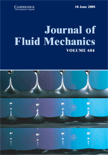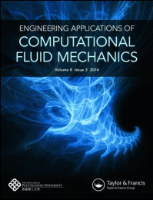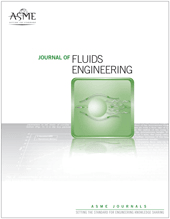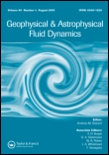
JOURNAL OF FLUID MECHANICS
Scope & Guideline
Innovative insights for the fluid dynamics community.
Introduction
Aims and Scopes
- Fluid Dynamics Fundamentals:
The journal emphasizes fundamental studies in fluid dynamics, including the mathematical modeling of fluid flows, stability analysis, and turbulence theory. - Experimental Fluid Mechanics:
Research involving experimental techniques to investigate fluid behavior, including flow visualization, particle image velocimetry (PIV), and laser Doppler anemometry. - Computational Fluid Dynamics (CFD):
Papers that utilize numerical simulations to solve complex fluid flow problems, including turbulence modeling, heat transfer, and multiphase flows. - Interfacial and Multiphase Flows:
Studies focusing on the dynamics of interfaces, including capillary effects, droplet dynamics, and the interactions of different phases in fluids. - Biofluid Mechanics and Biological Applications:
Research that applies fluid mechanics principles to biological systems, exploring topics such as swimming organisms, blood flow, and respiratory dynamics. - Environmental Fluid Mechanics:
Investigations into fluid mechanics phenomena relevant to environmental science, including oceanic flows, atmospheric dynamics, and sediment transport. - Energy and Propulsion Systems:
Research contributing to the understanding of energy systems, including flow around vehicles, wind turbines, and heat exchangers.
Trending and Emerging
- Machine Learning and Data-Driven Approaches:
An increasing number of studies are utilizing machine learning techniques to model fluid flows, optimize simulations, and analyze complex data sets, indicating a shift towards integrating artificial intelligence in fluid mechanics. - Multiscale and Multiphysics Modeling:
Research that combines various scales and physical phenomena, such as fluid-structure interactions and coupled thermal dynamics, is on the rise, reflecting the complexity of real-world applications. - Active and Passive Control Techniques:
Studies exploring active control methods for turbulence reduction or flow optimization, as well as passive control strategies using surface modifications, are gaining traction. - Bio-inspired Fluid Mechanics:
Research inspired by biological systems, such as swimming mechanisms in animals and plants, is increasingly popular, leading to innovations in bio-inspired designs and applications. - Environmental and Geophysical Fluid Mechanics:
There is a growing interest in fluid dynamics applications related to environmental issues, such as climate change impacts, pollutant dispersion, and energy harvesting from natural flows. - Non-Newtonian Fluid Dynamics:
The study of non-Newtonian fluids, particularly in industrial applications and biological systems, is emerging as a significant area of research due to its relevance in various engineering fields.
Declining or Waning
- Classical Hydrodynamics:
Studies focused solely on classical hydrodynamics without modern applications or interdisciplinary connections have seen a decline as researchers explore more complex fluid dynamics scenarios. - Linear Stability Theory:
While still important, the frequency of papers solely dedicated to linear stability theory has diminished as researchers increasingly focus on nonlinear effects and real-world applications. - Simplistic Models of Turbulence:
Research employing overly simplistic turbulence models has decreased in favor of more sophisticated approaches, including machine learning and data-driven methods. - Static Fluid Mechanics:
Research focused on static or equilibrium states of fluids has declined in favor of dynamic studies that account for time-dependent and transient behaviors.
Similar Journals

Physical Review Fluids
Unraveling Complexities in Fluid FlowPhysical Review Fluids is an esteemed journal published by the American Physical Society, focusing on the intricate and essential field of fluid dynamics. With an impressive Q1 ranking in categories such as Computational Mechanics, Fluid Flow and Transfer Processes, and Modeling and Simulation, this journal serves as a pivotal resource for researchers and professionals seeking to disseminate high-quality and innovative research findings. The journal's scope encompasses a broad spectrum of topics within fluid mechanics, promoting advancements in theoretical, computational, and experimental methodologies. Although it is not an open-access journal, its publications are critically well-received, underpinned by its strong standing in the Scopus rankings which place it in the top percentiles across various relevant fields. Physical Review Fluids has been a foundational platform for scholars to share their discoveries from 2016 through 2024, making it an indispensable asset in the ongoing evolution of fluid dynamics research.

Engineering Applications of Computational Fluid Mechanics
Exploring the Frontiers of Computational Fluid MechanicsEngineering Applications of Computational Fluid Mechanics is an esteemed journal published by Taylor & Francis Ltd that serves as a vital resource for researchers, professionals, and students in the field of fluid mechanics and its computational applications. With an ISSN of 1994-2060 and an E-ISSN of 1997-003X, this journal has established its reputation through its rigorous peer-review process and commitment to Open Access since 2015, facilitating widespread dissemination of cutting-edge research. Based in the United Kingdom, the journal is indexed in leading databases and has achieved a significant impact in its categories, ranking in the top quartile (Q1) for both Computer Science (miscellaneous) and Modeling and Simulation as of 2023. Notably, its Scopus rankings place it in the top 4% of Mathematics/modeling and simulation, highlighting its importance in advancing knowledge and innovation within the discipline. The journal invites contributions that explore both theoretical and practical aspects of computational fluid dynamics, fostering collaboration and intellectual growth within the community.

Journal of Fluid Science and Technology
Advancing the Frontiers of Fluid DynamicsThe Journal of Fluid Science and Technology, published by the Japan Society of Mechanical Engineers, serves as a pivotal platform for the dissemination of cutting-edge research in the fields of fluid mechanics and mechanical engineering. With an ISSN of 1880-5558, this Open Access journal has been dedicated to advancing the understanding of fluid flow and transfer processes since its establishment. As of 2023, it holds a significant position with a Q3 quartile ranking in both Fluid Flow and Transfer Processes and Mechanical Engineering categories. Researchers and practitioners are encouraged to explore the journal’s extensive collection of articles, contributing to the body of knowledge that impacts various practical applications in engineering and technology. The journal, which has established a reputation for quality amidst a competitive landscape, further fosters international collaboration and education by providing unrestricted access to its content. For professionals and students alike, the Journal of Fluid Science and Technology represents an invaluable resource for the latest findings and innovations in fluid dynamics and mechanical systems.

Flow
Pioneering research that propels engineering into the future.Flow is a premier open access journal published by Cambridge University Press, dedicated to advancing research in the fields of Aerospace Engineering, Biomedical Engineering, and Fluid Flow and Transfer Processes. Launched in 2021, Flow has rapidly gained recognition and has achieved a prestigious Q1 ranking in its categories for 2023, underscoring its influential role in disseminating high-quality research. With an emerging impact factor and a strong commitment to accessibility, the journal provides a crucial platform for researchers, professionals, and students to share innovative findings and foster collaboration across disciplines. Flow is headquartered in the United Kingdom and is part of Cambridge University's effort to promote scholarly communication that transcends traditional barriers. Whether you are looking to submit your work or explore cutting-edge studies in your field, Flow offers a dynamic and rigorous environment for intellectual exchange.

JOURNAL OF FLUIDS ENGINEERING-TRANSACTIONS OF THE ASME
Exploring the Depths of Fluid DynamicsJOURNAL OF FLUIDS ENGINEERING-TRANSACTIONS OF THE ASME, published by the renowned American Society of Mechanical Engineers (ASME), stands as a pivotal platform for disseminating cutting-edge research in the field of mechanical engineering, specifically focusing on fluid mechanics and its diverse applications. With an established history dating back to 1897, this journal features research that pushes the boundaries of knowledge and technology in areas such as fluid dynamics, thermal engineering, and hydrodynamics. Although it is not an open-access journal, it maintains rigorous peer-review standards, ensuring the publication of high-quality scholarly articles that contribute to the academic and professional community. In the latest rankings, it holds a respectable position within the Q2 category of mechanical engineering journals, reflecting its significant impact, as evidenced by its Scopus rank of #204 out of 672, placing it in the 69th percentile. Researchers, professionals, and students alike will find this journal to be a vital resource for the latest developments and innovative insights in fluids engineering.

Case Studies in Thermal Engineering
Driving Innovation with Open Access Case StudiesCase Studies in Thermal Engineering, published by ELSEVIER, stands as a premier platform for innovative research and analysis in the field of thermal engineering since its inception in 2013. With a robust Open Access model, this journal ensures that groundbreaking findings in fluid flow and transfer processes are readily accessible to a global audience, fostering collaboration and knowledge sharing across disciplines. Situated in the United Kingdom, the journal boasts an impressive impact factor, reflecting its status in the first quartile (Q1) for both engineering (miscellaneous) and fluid flow and transfer processes, as noted in the latest Scopus rankings. Researchers and professionals alike recognize its significance, ranking 9th out of 96 in Chemical Engineering and achieving a notable 91st percentile in its category. By publishing high-quality case studies, the journal aims to advance understanding and applications of thermal engineering principles, making it an essential resource for those looking to stay at the forefront of this dynamic field.

Fluid Dynamics
Advancing the frontiers of fluid flow research.Fluid Dynamics is a distinguished journal that has been at the forefront of research in the field of fluid flow and transfer processes since its inception in 1966. Published by MAIK NAUKA/INTERPERIODICA/SPRINGER, this journal serves as a valuable platform for engineers, scientists, and researchers dedicated to advancing the understanding of mechanical and fluid dynamic phenomena. With a Q3 ranking in key categories such as Fluid Flow and Transfer Processes, Mechanical Engineering, and Physics and Astronomy, Fluid Dynamics holds a significant position in the academic community, attracting submissions that push the boundaries of knowledge and application. Although it does not currently offer open access options, the journal is recognized for its robust editorial standards and impactful contributions to the field, making it essential reading for anyone involved in fluid dynamics research. Given its consistent publication through to 2024, Fluid Dynamics continues to inspire innovation and collaboration in an ever-evolving scientific landscape.

GEOPHYSICAL AND ASTROPHYSICAL FLUID DYNAMICS
Pioneering Research at the Intersection of Earth and SpaceGEOPHYSICAL AND ASTROPHYSICAL FLUID DYNAMICS, published by Taylor & Francis Ltd, is a pivotal journal that caters to the intersection of fluid dynamics within geophysical and astrophysical contexts. With an ISSN of 0309-1929 and an E-ISSN of 1029-0419, this journal has been a cornerstone of interdisciplinary research since its inception in 1971. It showcases cutting-edge studies in fluid dynamics as applied to various fields including Astronomy, Geophysics, and Computational Mechanics, reflected in its 2023 category rankings of Q2 and Q3 across diverse areas such as Geochemistry and Mechanics of Materials. The journal aims to provide a platform for original research, theoretical advancements, and comprehensive reviews that contribute to the understanding of fluid behavior in natural and extraterrestrial environments. Although currently not open access, it remains influential in its fields, appealing to a dedicated audience of researchers, professionals, and students seeking to deepen their knowledge and foster innovative approaches to complex fluid dynamics problems. Leveraging its robust Scopus rankings, the journal continues to advance scholarly discourse and support the evolving narratives of geophysical and astrophysical sciences.

EUROPEAN JOURNAL OF MECHANICS B-FLUIDS
Bridging Theory and Application in Fluid MechanicsThe EUROPEAN JOURNAL OF MECHANICS B-FLUIDS, published by Elsevier, is a prominent journal in the field of fluid mechanics, addressing the theoretical and experimental aspects of fluid behavior. Since its inception in 1990, this journal has consistently fostered a robust academic dialogue, maintaining a significant impact evidenced by its Q2 ranking in both Mathematical Physics and Physics and Astronomy categories as of 2023, placing it among the top publications in these disciplines. Researchers and professionals focusing on fluid dynamics will find a wealth of knowledge in its articles, which span broad topics pertinent to real-world applications as well as fundamental theories. While the journal is not open access, it offers critical insights that shape ongoing studies in fluid mechanics, making it an invaluable resource for anyone looking to deepen their understanding of the field. Located in the innovative environment of Amsterdam, Netherlands, the journal serves as a nexus for cutting-edge research and collaboration globally.

Journal of the Serbian Society for Computational Mechanics
Exploring New Dimensions in EngineeringJournal of the Serbian Society for Computational Mechanics, published by the Serbian Society for Computational Mechanics, is a vital platform for advancing research and knowledge in the field of computational mechanics. Established in 2012, this journal serves the academic community by providing a forum for innovative studies, methodologies, and applications within computational mechanics, presenting valuable insights for researchers, professionals, and students alike. With an ISSN of 1820-6530 and a ranking of Q4 in Computational Mechanics, it carries an essential influence in the engineering realm, despite its current rank of 71 out of 89. The journal's commitment to scholarly excellence aims to foster collaboration and encourage interdisciplinary research, making it an important resource for those invested in the evolving landscape of computational methodologies. Although the journal currently does not offer Open Access options, it remains dedicated to disseminating knowledge that will resonate within the local and global scientific community.